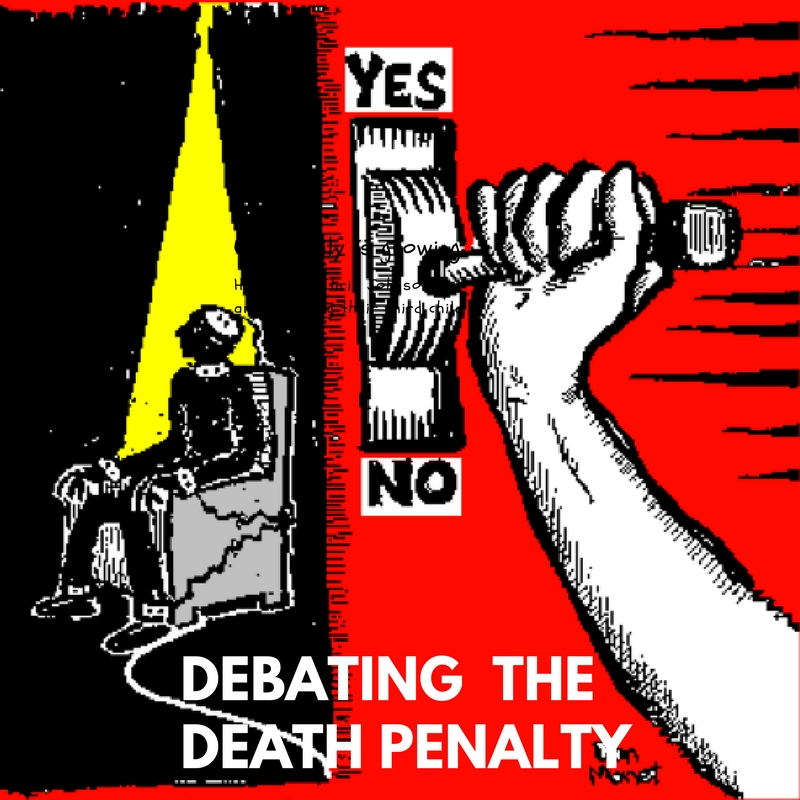Debating the Death Penalty
Imagine that you are a judge. Presented with a man who has killed 3 innocent people, you must decide whether or not to sentence the killer to death. There are many things to take into consideration: How much will it cost to keep him alive? Is it against one’s religion to practice the death penalty? Is the death penalty morally acceptable? These are the questions that have fueled the death penalties ongoing debate.
The first recorded death sentences occurred in 16th Century BC Egypt, and were often cruel, including crucifixion, burial alive, drowning at sea, beating to death, and impalement. As time went on, the sentence became more humane. Undergoing reformation between 1776-1800, Thomas Jefferson and four others proposed that the death penalty should be only the consequence for treason and murder, a step down from the previous two hundred and twenty two crimes that were punishable by death. Although recently outlawed in most states, the Death penalty remains a controversial subject to this day.
Nowadays, the death penalty is a very controversial topic in the United States. One of it’s biggest supporters is our very own president, Donald Trump. He is an open supporter of not only the death penalty, but also Singapore’s capital punishment policies. He states that he would “love to have a law” that executes any drug dealers. Trump states, “You know the Chinese and Filipinos don’t have a drug problem. They just kill them.” Trump, with his words and actions, shows us that he feels like the only solution we have to deal with major crimes is the death penalty.
A number of sources got together and discussed their opinions on the death penalty. An associate professor of philosophy at Pasadena City College, Edward Feser, gives his opinion and says “The capital punish system is a filter that selects the worst.” Feser is implying that the penalty should be inferred to the worst crimes and that he is in favour. Also, he states, “to sentence killers like those described above to less than death would fail to do justice because the penalty-presumably a long period in prison-would be grossly disproportionate to the heinousness of the crime.” Feser is giving the message that it would be a wrongdoing of the federal government if they were to abolish the death penalty, due to the fact that the criminals would not be fairly punished. They would be be granted life in prison when they don’t have the right to live looking at the circumstances of the crime.
On the other hand, if we look at the opposing viewpoint we are faced with an ethical lens. 18 out of our 50 states say that the death penalty is not morally correct. These people have opposed the government’s implementation of the death penalty in their home states because they believe that there are imperfections in the justice system. That being said, there are statistics that show that there have been a plethora of flaws while placing people on death row. Nebraska state senate, Ernie Chamber, gave us statistics that stated that in the past few years, over 150 people were taken off death row because they turned out to be innocent. Not only that, but a law professor at Stanford University argued that there are no statistics that show that capital punishment has reduced the homicide rate.
With two radical sides to the debate, the argument about the morality of the Death penalty has many radical opinions. Most of the U.S. believes that the death penalty is wrong, saying that it goes against their religion or contradicts itself. Although this standpoint is becoming more popular, diehard death penalty supporters still mouth their opinions, arguing that no other sentence serves justice. Although people may argue all day over who is right or wrong, it is important to acknowledge that there is no real correct side when it comes to the death penalty. With each scenario differing from the next, every case is a question of one’s individual morals, and cannot be measured on a generalized scale. As long as people have unique morals, this fiery debate will remain perpetual.
Sources:
Amnesty International . “Death Penalty – Amnesty International USA.” Amnesty
International USA, 1 Mar. 2018, www.amnestyusa.org/issues/death-penalty/
Death penalty is the ultimate denial of human rights.
Death Penalty Information Center. “Upcoming Executions.” Death Penalty Information Center,
28 Feb. 2018, deathpenaltyinfo.org/upcoming-executions. Helped us see cases of people on death row
Death Penalty.” Pew Research Center, 13 July 2015,
www.pewresearch.org/fact-tank/2015/07/13/some-major-u-s-religious-groups-differ-from-their-members-on-the-death-penalty/. Religious perspective on death row.
Greene, Leonard. “Trump Thinks Killing Dealers May Solve Nation’s Drug Problem.” NY Daily
News, NEW YORK DAILY NEWS, 26 Feb. 2018, www.nydailynews.com/news/politics/trump-thinks-kill-dealers-solve-nation-drug-problem-article-1.3841957. What our president thinks about the topic.zxc
Lipka, Michael. “Some Major U.S. Religious Groups Differ from Their Members on the
International Commission Against the Death Penalty. “Why the Death Penalty Should Be
Abolished.” International Commission against the Death Penalty,
5 Mar. 2018, www.icomdp.org/arguments-against-the-death-penalty/.
Lipka, Michael. “Support for death penalty drops among Americans.” Pew Research Center, 12 Feb. 2014, www.pewresearch.org/fact-tank/2014/02/12/support-for-death-penalty-drops-among-americans/.Statistics about American support for the death penalty.
Neuhauser, Alan. “Executions, Death Sentences Up Slightly in 2017.” U.S. News and World Reports , 28 Dec. 2017, 5:50pm, www.usnews.com/news/national-news/articles/2017-12-28/executions-death-sentences-up-slightly-in-2017. Percentage of people on death row went up in 2017.
ProCon.org. “Top 10 Pro & Con Arguments – Death Penalty – ProCon.Org.” Should the Death
Penalty Be Allowed?, deathpenalty.procon.org/view.resource.php?resourceID=002000.
Gives views coming from each side of the death penalty debate.
ProCon.org. “41 Federal Capital Offenses – Death Penalty – ProCon.Org.” Should the Death Penalty Be Allowed?, 12 Sept. 12AD, deathpenalty.procon.org/view.resource.php?resourceID=004927.
Examples of crimes that result in the death penalty.
Reggie, Micheal H. “History of the Death Penalty.” PBS, Public Broadcasting Service,
www.pbs.org/wgbh/pages/frontline/shows/execution/readings/history.html.
The history of the Death Penalty.
Santhanam, Laura. “Does the death penalty bring closure to a victim’s family?” PBS, Public Broadcasting Service, 25 Apr. 2017, www.pbs.org/newshour/nation/death-penalty-bring-closure-victims-family. How the death penalty affects families.

Daniela Najera is a Senior at Lincoln High School and is in translations and interpretations class. She loves to spend time with her friends and family...









